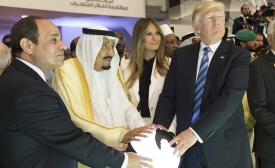Nation Image
Why is culture important in this day and age? When the world, as some say, is becoming more flat, when social media platforms make instant communication possible, when cities all over the globe resemble each other more and more, of what significance is it that the Philippines should project itself as having a distinct identity and culture—in other words, possess a brand that is as easily identifiable as the Japanese, the Brazilian or the Egyptian?This is the question that cultural diplomacy poses, and which is the challenge given to Filipino diplomats in the 21st century.
Donald J. Trump’s first foreign trip as U.S. President is now history, but the repercussions are likely to be felt for years to come. [...] Trump disrespected the entire NATO alliance system, broke with the rest of the G-7 on the Paris climate change agreement and, in general, behaved boorishly. Given the chance to welcome NATO’s newest member, Montenegro, Trump pushed its prime minister aside to claim his own front row spot for the traditional “family photo” of NATO summit leaders.

Mark Dillen on the negative image of President Trump's first trip overseas.

A new article by Ilan Manor looks at the U.S. State Department's attempts at branding America.
Using emojis to help shape the nation's image is a playful, but not frivolous approach to foreign policy. Finland is a highly educated country where tech is an important industry. The selection of emojis appears to be a way to highlight Finland's values and Arctic presence, while also demonstrating its tech expertise.
Most of these aid projects were carried out through a competitive bidding system open to eligible enterprises and there was little space for Chinese NGOs to participate. "Most of these foreign aid projects are large engineering projects, and the design of the bidding system leaves no space for NGOs to take part," Ji Lin, managing secretary at Global Environmental Institute, told the Global Times.
Philibert Browne, editor of Liberia’s Hot Pepper newspaper, says China is winning admiration. In Liberia, it has built roads — ones of not obviously inferior quality — and a spanking new campus at the University of Liberia, replete with friendship tower and Chinese-style gate. “You can see what they are spending their money on but you can’t see what the Americans are spending on,” Mr Browne says. “You don’t put capacity building on your meal table. Slowly but surely, the Chinese are winning in Africa.”







